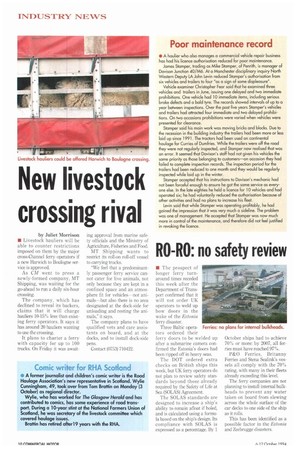Poor maintenance record
Page 14

If you've noticed an error in this article please click here to report it so we can fix it.
• A haulier who also manages a commercial vehicle repair business has had his licence authorisation reduced for poor maintenance.
James Stamper, trading as Mike Stamper, of Pen rith, is manager of Davison Junction 40/M6. At a Manchester disciplinary inquiry North Western Deputy LA John Levin reduced Stamper's authorisation From six vehicles and trailers to four "as a sign of some displeasure".
Vehicle examiner Christopher Fear said that he examined three vehicles and trailers in June, issuing one delayed and two immediate prohibitions. One vehicle had 10 immediate items, including serious brake defects and a bald tyre. The records showed intervals of up to a year between inspections. Over the past five years Stamper's vehicles and trailers had attracted four immediate and two delayed prohibitions. On Iwo occasions prohibitions were varied when vehicles were presented for clearance. Stamper said his main work was moving bricks and blocks. Due to the recession in the building industry the trailers had been more or less laid up since 1991. The tractors had been used on continental haulage for Curries of Dumfries. While the trailers were off the road they were not regularly inspected, and Stamper now realised that was an error. It seemed that Davison's staff had not given his vehicles the same priority as those belonging to customers—on occasion they had failed to complete inspection records. The inspection period for the trailers had been reduced to one month and they would be regularly inspected while laid up in the winter. Stamper accepted that his instructions to Davison's mechanic had not been forceful enough to ensure he got the same service as everyone else. In the late eighties he held a licence for 10 vehicles and had operated six; he had voluntarily reduced the authorisation because of other activities and had no plans to increase his fleet.
Levin said that while Stamper was operating profitably, he had gained the impression that it was very much a sideline. The problem was one of management. He accepted that Stamper was now much more in control of the maintenance, and therefore did not feel justified in revoking the licence.




























































































